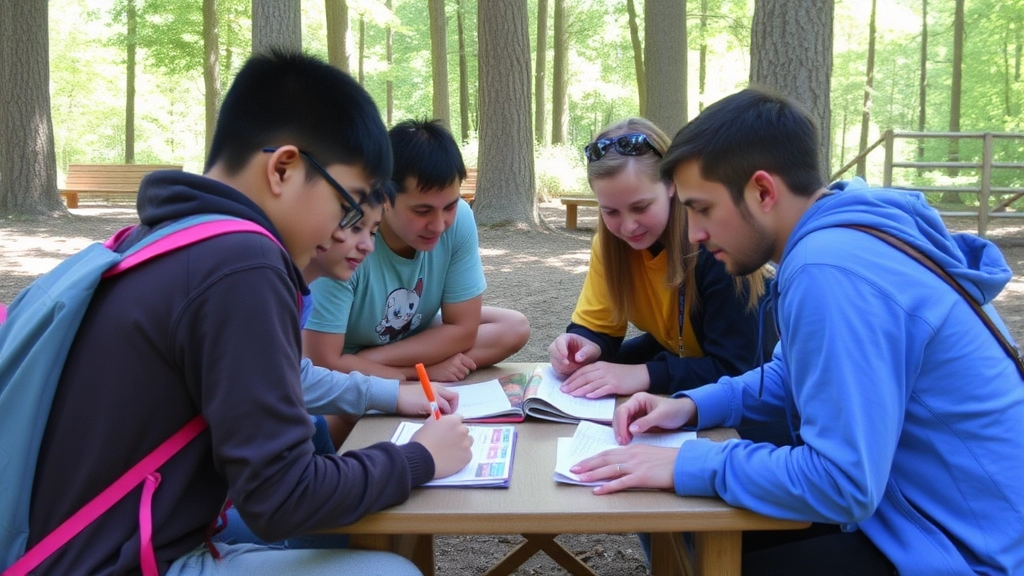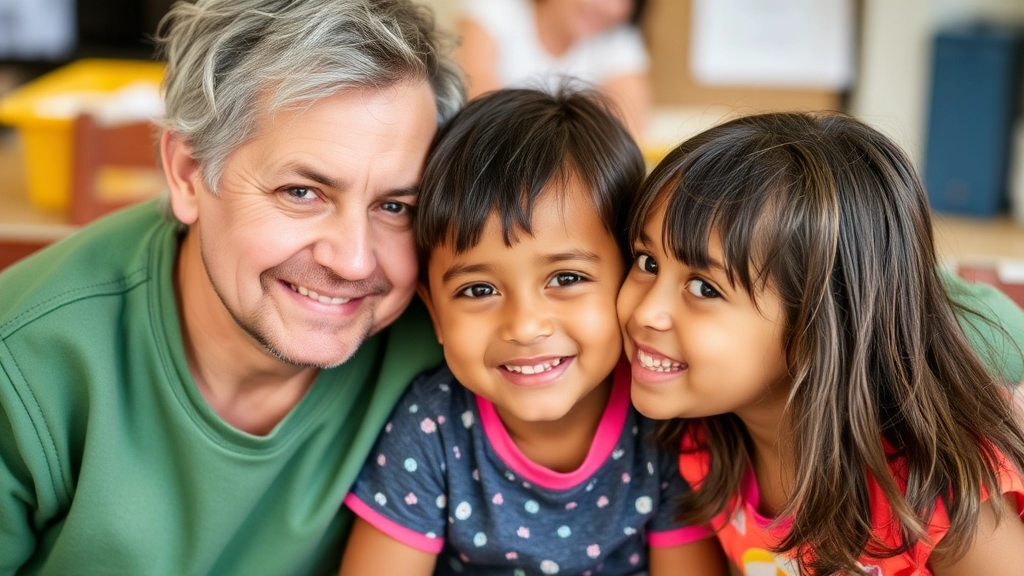Enriching Summer Experiences for Gifted Children
Are you looking for an enriching summer experience for your gifted elementary child? Social sciences summer camps might be the perfect fit. These camps offer a unique blend of educational and social benefits, designed to engage curious minds in subjects like history, sociology, and anthropology. From expert instructors to interactive activities, these camps provide an environment where gifted kids can thrive intellectually and emotionally.
Exploring the Benefits
In this article, we’ll explore the numerous benefits of social sciences summer camps, key features to look for, and tips on choosing the right camp for your child. We’ll also delve into the activities and curriculum, social and emotional development opportunities, and share testimonials from parents and children. Plus, we’ll cover the registration process, important dates, and financial aid options to ensure you have all the information you need to prepare your child for an unforgettable summer. Dive in to discover how these camps can transform your child’s summer experience!
Key Features of Effective Social Sciences Summer Camps

So, you’re thinking about sending your gifted child to a social sciences summer camp. But how do you know which one is worth it?
Let’s break it down.
What Makes a Social Sciences Summer Camp Effective?
First off, these camps should be more than just a way to fill the summer. They need to offer real value.
Here’s what to look for:
1. Expert Instructors
You want teachers who know their stuff. Look for camps staffed by professionals with backgrounds in education or social sciences.
- Qualified Staff: Are the instructors experienced?
- Background Checks: Safety first. Always.
2. Engaging Curriculum
The curriculum should be challenging but not overwhelming. It should stimulate curiosity and encourage critical thinking.
- Project-Based Learning: Hands-on projects that make learning fun.
- Interactive Lessons: No boring lectures. Think debates, role-playing, and experiments.
3. Small Class Sizes
Smaller groups mean more personalised attention. Your child won’t get lost in the crowd.
- Ideal Ratio: Look for camps with a low student-to-teacher ratio.
- Individual Attention: More focus on your child’s needs.
4. Diverse Activities
A good camp offers a mix of activities. This keeps kids engaged and helps them learn in different ways.
- Field Trips: Real-world learning experiences.
- Guest Speakers: Experts who can offer new perspectives.
5. Social and Emotional Support
Gifted kids often have unique social and emotional needs. The camp should address these.
- Counselling Services: Available for kids who need it.
- Peer Interaction: Opportunities to make friends and build social skills.
6. Safe and Inclusive Environment
Your child should feel safe and welcomed.
- Anti-Bullying Policies: Zero tolerance for bullying.
- Inclusive Atmosphere: Respect for all backgrounds and abilities.
7. Parent Involvement
Parents should be kept in the loop about what their kids are learning.
- Regular Updates: Newsletters or progress reports.
- Open Communication: Easy ways to contact staff with questions or concerns.
Real Talk: Why These Features Matter
Imagine this: Your child comes home buzzing about the day’s activities. They’ve learned something new and can’t wait to share it with you. That’s the kind of experience you want.
These features ensure your child isn’t just passing time but growing intellectually and emotionally.
Final Thoughts
Choosing the right camp is crucial. The right features make all the difference.
Ready to Dive In?
Now that you know what to look for, start your search. Your child’s summer adventure in social sciences awaits.
Next Up: How to Choose the Right Summer Camp for Gifted Kids
How to Choose the Right Summer Camp for Gifted Kids
Alright, let’s get real. Choosing the right summer camp for your gifted kid can feel like navigating a maze. You’re probably asking yourself: “How do I find a camp that challenges my child but also lets them have fun?” or “What if the camp isn’t a good fit?” Trust me, I’ve been there. Here’s a straightforward guide to help you make the best choice.
Identify Your Child’s Interests and Strengths
First off, know what your kid loves. Is it history, sociology, or maybe economics? Gifted kids usually have strong preferences, so make a list of their interests and strengths. This will help you narrow down camps that offer specialised programmes in those areas.
Research the Camp’s Curriculum
Not all social sciences camps are created equal. Look for:
- Detailed Curriculum: Does the camp provide a syllabus or an outline of what will be covered?
- Qualified Instructors: Are the teachers experienced in working with gifted kids?
- Hands-On Activities: Are there practical, engaging activities that go beyond textbook learning?
Check Reviews and Testimonials
Word of mouth is gold. Read reviews and testimonials from other parents and kids. Honest feedback can give you a clearer picture of what to expect.
Visit the Camp (If Possible)
If the camp is local, take a tour. See the facilities, meet the staff, and get a feel for the environment. If it’s far away, many camps offer virtual tours or open houses.
Consider the Camp’s Philosophy
Does the camp’s teaching philosophy align with your child’s learning style? Some camps focus on project-based learning, while others might emphasise individual research. Choose one that complements how your child learns best.
Look at Social and Emotional Support
Gifted kids can sometimes feel out of place. Check if the camp offers:
- Counselling Services: Are there counsellors available for emotional support?
- Peer Interaction: Will your child have opportunities to socialise with like-minded peers?
Examine the Camp’s Safety Measures
Safety first, always. Make sure the camp has:
- Emergency Protocols: What’s their plan for emergencies?
- Health Services: Is there a nurse or medical professional on-site?
Evaluate the Cost and Financial Aid
Camps can be pricey, but many offer scholarships and financial aid. Don’t let cost deter you. Look into all available options.
Assess the Camp’s Flexibility
Life happens. Check the camp’s policies on:
- Cancellations and Refunds: What if you need to cancel last minute?
- Schedule Flexibility: Can you choose specific weeks or sessions?
Talk to Your Child
Finally, involve your child in the decision-making process. Discuss the options and get their input. Their enthusiasm and comfort with the choice are crucial.
Activities and Curriculum in Social Sciences Camps

So, you’re considering a social sciences summer camp for your gifted child, but you’re wondering, “What exactly will they be doing all day?”
Great question.
Let’s dive into the activities and curriculum that make these camps a hit.
What’s on the Agenda?
First off, these camps aren’t just about sitting in a classroom. The whole point is to make learning fun and engaging. Here’s a taste of what your child can expect:
- Interactive Workshops: Think hands-on activities where kids role-play historical events or simulate government functions.
- Field Trips: Visits to museums, historical sites, or even local government offices. Real-world experiences make learning stick.
- Group Projects: Collaborative tasks that teach kids to work as a team, solve problems, and present their findings.
- Guest Speakers: Experts from various fields like archaeology, sociology, or political science. Real people sharing real experiences.
Curriculum Breakdown
Now, let’s talk curriculum. It’s not just about cramming facts. It’s about developing critical thinking and analytical skills.
- History: Not just dates and names. Kids explore cause and effect, the impact of historical events, and different perspectives.
- Geography: Beyond maps. Understanding how geography affects culture, politics, and economies.
- Civics: Learning about government structures, civic duties, and the importance of participation.
- Anthropology: Discovering different cultures, their customs, and how societies evolve.
Real-Life Skills
Why should you care about all this?
Because these camps teach real-life skills. Here’s a quick list:
- Critical Thinking: Analysing information and forming reasoned conclusions.
- Communication: Presenting ideas clearly and effectively.
- Teamwork: Working well with others to achieve common goals.
- Problem-Solving: Tackling challenges with creative solutions.
Stories from the Trenches
Let me share a quick story.
One parent told me how their child came home from camp and started a mini archaeological dig in their backyard. They were so inspired by the camp’s activities that they wanted to apply what they learned immediately.
That’s the kind of impact we’re talking about.
Wrapping Up
So, what will your child be doing at a social sciences summer camp?
They’ll be learning, exploring, and growing in ways that traditional classrooms just can’t match.
And trust me, they’ll love every minute of it.
Ready to dive deeper? Check out our section on How to Choose the Right Summer Camp for Gifted Kids.
Got more questions? Head over to our Frequently Asked Questions section.
Social and Emotional Development in Summer Camps
Ever worry about your gifted kid fitting in or making friends? You’re not alone. Many parents fret over their child’s social and emotional growth, especially when they’re exceptionally bright. Social Sciences Summer Camps can be a game-changer here.
Why Social and Emotional Development Matters
First off, let’s talk about why this is crucial. Gifted kids often feel out of place in regular settings. They may struggle with making friends or understanding social cues. This can lead to loneliness or even anxiety. But a summer camp tailored for them? That’s where the magic happens.
Real Benefits
These camps offer:
- Peer Interaction: Your child will meet other gifted kids, making it easier to form friendships.
- Teamwork: Group activities foster collaboration, teaching kids to work together effectively.
- Emotional Intelligence: Camps often include activities that enhance empathy and self-awareness.
Real Stories
Take Sarah, for example. She was always the “odd one out” in her class, but at camp, she found her tribe. She came back more confident and happier. Her mum noticed a significant change in her social skills and emotional well-being. And that’s not just a one-off; many parents have similar stories.
Activities That Boost Social and Emotional Skills
These camps aren’t just about learning; they’re about growing. Here’s how they do it:
- Group Projects: Tackling social science topics in teams.
- Role-Playing Games: Helps kids understand different perspectives.
- Discussion Circles: Encourages open dialogue and empathy.
What to Look For
When choosing a camp, ensure they offer:
- Qualified Staff: Look for counsellors trained in child psychology or social sciences.
- Balanced Schedule: A mix of academic and social activities.
- Safe Environment: A setting where kids feel secure to express themselves.
How to Prepare Your Child
Before sending your child off, have a chat. Explain what they can expect and encourage them to be themselves. Pack some comfort items and maybe a journal for them to jot down their experiences.
For more information on finding the perfect camp, check out our guide on Top Summer Camps for Teens. And if you’re looking for a camp that balances fun and learning, don’t miss our review of Primrose Summer Camps.
Testimonials from Parents and Children

Wondering if a social sciences summer camp is worth it?
You’re not alone.
Parents and kids often ask, “Will it be fun? Will my child actually learn something valuable?”
Let’s dive into some real stories from those who’ve been there.
From the Parents:
Emily, Mum of a 10-year-old:
“I was sceptical at first. My son is gifted, and I didn’t want him to be bored. But this camp was a game-changer. He came home every day buzzing with new facts and stories about history and cultures. It wasn’t just fun; it was an educational goldmine.”
John, Dad of an 8-year-old:
“My daughter has always been curious about how societies work. This camp fed her curiosity in ways I couldn’t have imagined. The hands-on activities and engaging discussions made her feel like a mini-anthropologist. She can’t wait to go back next year.”
From the Kids:
Lucy, 9 years old:
“I loved learning about ancient Egypt! We even made our own pyramids. It felt like I was travelling back in time. Plus, I made so many new friends who love the same stuff as me.”
Tom, 11 years old:
“At first, I thought it would be like school, but it was way cooler. We did role-playing games about different cultures and even had debates. It was awesome to see how different people think and live.”
Why These Testimonials Matter
These testimonials give you a peek into what your child can expect.
They highlight the engaging activities, social connections, and educational benefits.
If you’re still on the fence, think about this:
Wouldn’t you want your child to come home excited about learning?
Wouldn’t you love to see them make friends who share their interests?
Internal Links for More Info
- Curious about the activities and curriculum? Check out Section IV.
- Want to know about social and emotional development? Head over to Section V.
Registration Process and Important Dates
Alright, let’s dive into the nitty-gritty of the registration process and important dates for social sciences summer camps for gifted elementary kids. I know, this part can seem a bit daunting, but stick with me, and I’ll break it down into bite-sized pieces that are super easy to digest.
Real Questions and Worries
I get it. As a parent, you’re probably wondering:
- “When should I start looking at camps?”
- “How do I make sure I don’t miss any deadlines?”
- “What if the camp fills up before I get a chance to register?”
These are legit concerns, and I’m here to help you navigate through them.
Key Dates to Remember
First off, let’s talk about key dates. Most summer camps start their registration process several months in advanceâtypically around January or February. Here’s a quick breakdown:
- January-February: Early bird registration opens. This is your golden window to snag a spot and maybe even get a discount.
- March-April: Regular registration period. Still a good time to register, but spots are filling up.
- May-June: Late registration. You might still find a spot, but it could be a bit of a scramble.
Mark these months on your calendar and set reminders. Trust me, you don’t want to miss out because you forgot to register on time.
Step-by-Step Registration Process
Now, let’s get into the step-by-step registration process. It’s usually pretty straightforward, but here’s how to make it even smoother:
- Research Camps: Look into various social sciences summer camps and compare their features, activities, and reviews. (Check out our section on How to Choose the Right Summer Camp for Gifted Kids for more tips.)
- Check Dates: Once you’ve shortlisted a few camps, note their registration dates and deadlines.
- Prepare Documents: Camps often require some paperworkâmedical forms, proof of age, etc. Get these ready in advance.
- Online Registration: Most camps offer online registration. Fill out the forms, upload necessary documents, and pay the registration fee.
- Confirmation: After registering, you’ll receive a confirmation email. Keep this handy for future reference.
Stories and Examples
Let me share a quick story. Last year, my friend Sarah was on the fence about registering her son for a social sciences camp. She waited until mid-April, and by then, the camp was almost full. She managed to snag one of the last spots, but it was a close call. Moral of the story? Don’t procrastinate!
Internal Linking Opportunities
For more insights on what to expect during camp, check out our section on Activities and Curriculum in Social Sciences Camps. And if you’re worried about the financial aspect, we’ve got you covered with our section on Scholarships and Financial Aid Options.
Scholarships and Financial Aid Options

Alright, let’s talk money.
We all know summer camps can get pricey, especially the top-notch ones for gifted kids.
So, how do you make it work without breaking the bank?
Scholarships and financial aid, my friend.
Why Should You Care?
- Affordability: You want the best for your kid, but you don’t want to empty your wallet.
- Accessibility: Financial aid opens doors for more families, making these enriching experiences available to everyone.
Types of Financial Aid Available
- Merit-Based Scholarships:
- For the smarty-pants out there.
- These are awarded based on academic achievements or special talents.
- Need-Based Scholarships:
- If your financial situation is a bit tight, this one’s for you.
- They look at your income and other financial factors.
- Early Bird Discounts:
- Sign up early, save some cash. Simple as that.
- Sibling Discounts:
- Got more than one kid? Some camps offer discounts if you enrol siblings.
How to Find These Scholarships?
- Camp Websites:
- Most camps list their financial aid options online.
- Check the FAQ section or a dedicated scholarships page.
- School Counsellors:
- They’re a goldmine of info on scholarships.
- Don’t hesitate to ask them for help.
- Local Organisations:
- Community centres or local businesses sometimes sponsor kids for summer camps.
Application Tips
- Start Early:
- Deadlines sneak up fast.
- Get your application in as soon as possible.
- Gather Documents:
- You’ll need proof of income, academic records, and maybe even a personal statement.
- Be Honest:
- Don’t exaggerate your financial situation.
- Honesty goes a long way.
Real Stories
- Sarah’s Story:
- Sarah’s parents found a scholarship through their local library.
- She got to attend a top-tier social sciences camp and absolutely loved it.
- Tom’s Tale:
- Tom’s family wasn’t sure they could afford camp.
- They applied for a need-based scholarship and got it.
- Tom came back with a deeper understanding of history and a bunch of new friends.
Preparing Your Child for a Social Sciences Summer Camp
Are you worried about how to get your gifted child ready for a social sciences summer camp? I get it. The idea of sending your kid away for a summer can be daunting. But trust me, with a little preparation, you can set them up for an unforgettable experience. Let’s break it down.
Start with a Conversation
First things first, have a chat with your child. Ask them how they feel about going to camp. Are they excited, nervous, or maybe a bit of both? Address their concerns and hype up the fun aspects. This is the perfect time to introduce them to the idea of learning about history, geography, and cultures in a hands-on way.
Pack Smart
Packing can be a headache, but it doesn’t have to be. Here’s a quick checklist to keep it simple:
- Comfortable clothing: Think about the weather and pack accordingly.
- Educational materials: A few books or a tablet loaded with educational apps can be handy.
- Personal items: Don’t forget their favourite stuffed animal or a family photo to ease homesickness.
- Stationery: Notebooks, pens, and other supplies for jotting down notes or ideas.
Boost Their Independence
Gifted kids often thrive on independence. Encourage them to take responsibility for small tasks. This could be as simple as packing their own bag or setting an alarm. It builds confidence and makes them feel more in control.
Brush Up on Social Skills
Social sciences camps are not just about learning; they’re about making friends and working in teams. Role-play different social scenarios with your child. Teach them how to introduce themselves, ask questions, and listen actively. This will help them feel more at ease in a new social setting.
Get Familiar with the Camp
Before the camp starts, familiarise your child with the camp’s schedule and activities. If possible, visit the camp’s website together. Show them pictures, watch videos, and read about the activities they’ll be doing. This can make the unknown feel a bit more known.
Health and Safety First
Make sure your child is up-to-date with their vaccinations and has any necessary medications packed. Talk to the camp about their health and safety protocols. Knowing this information can ease both your mind and your child’s.
Set Goals Together
Sit down with your child and set some fun and educational goals for the camp. Maybe they want to learn about a specific historical event or make three new friends. Setting goals can give them something to focus on and look forward to.
Stay Connected
While it’s important to give your child space, staying connected can help ease homesickness. Agree on a communication plan. Maybe it’s a nightly phone call or a mid-week video chat. Knowing they can reach you can be a huge comfort.
If you’re still on the fence or have more questions, check out our Top Sleepaway Camps: A Parent’s Guide for more insights.
For those interested in sports, explore our Top Soccer Summer Camps for Kids and Teens to combine learning with athletic fun.
Ready to get started? Let’s make this summer one for the books!
Frequently Asked Questions About Social Sciences Summer Camps
“What exactly is a social sciences summer camp?”
Great question.
Think of it as a playground for the mind.
Kids dive into history, sociology, psychology, and more.
It’s like school but way more fun.
“Is it suitable for my gifted child?”
Absolutely.
These camps are designed to challenge and engage bright minds.
Your child will be in their element.
“What kind of activities will my child be doing?”
Loads of engaging stuff.
- Exploring historical events
- Debating social issues
- Conducting mini-experiments in psychology
- Participating in group projects
“Will my child make friends?”
Yes, 100%.
These camps foster a community of like-minded kids.
They’ll bond over shared interests and activities.
“How do I know if a camp is good?”
Look for:
- Experienced staff
- A well-rounded curriculum
- Positive reviews
- Safety protocols
“Are there any scholarships or financial aid options?”
Many camps offer scholarships.
Check their websites or give them a call.
You might be surprised at the options available.
“What should my child bring to camp?”
Usually, camps provide a list.
But generally:
- Comfortable clothing
- Notebooks and pens
- A water bottle
- Any required reading materials
“How do I prepare my child for camp?”
Simple:
- Talk to them about what to expect
- Pack together
- Encourage them to be open to new experiences
“What if my child has dietary restrictions?”
Most camps accommodate dietary needs.
Just let them know in advance.
“When should we register?”
Early bird gets the worm.
Check registration dates and sign up as soon as you can.
“What if my child doesn’t like it?”
It happens.
But most kids thrive.
If there’s an issue, talk to the camp staff.
They’re there to help.
For more tips on preparing for camp, check out our summer camping top tips.
Frequently Asked Questions about Social Sciences Summer Camps for Gifted Elementary Kids
What is a Social Sciences Summer Camp?
A Social Sciences Summer Camp is a specialized program designed to engage gifted elementary kids in subjects like history, geography, civics, and anthropology through interactive and hands-on activities.
Why should I consider a Social Sciences Summer Camp for my gifted child?
These camps offer a unique blend of educational and social experiences that challenge gifted kids intellectually while also addressing their social and emotional needs. They provide opportunities for critical thinking, problem-solving, and teamwork.
What should I look for in a good Social Sciences Summer Camp?
Look for camps with expert instructors, engaging and interactive curriculum, small class sizes, diverse activities, social and emotional support, a safe and inclusive environment, and opportunities for parent involvement.
What kind of activities can my child expect?
Activities often include interactive workshops, field trips, group projects, and sessions with guest speakers. These activities are designed to make learning fun and engaging.
How does the curriculum benefit my child?
The curriculum focuses on developing critical thinking and analytical skills. It covers topics like history, geography, civics, and anthropology, encouraging kids to explore different perspectives and understand the impact of historical events.
Are there any financial aid options available?
Yes, many camps offer scholarships and financial aid options such as merit-based scholarships, need-based scholarships, early bird discounts, and sibling discounts. Check camp websites, consult school counselors, or look into local organizations for more information.
How can I apply for scholarships or financial aid?
Start by visiting the camp’s website for information on available scholarships. You can also ask school counselors for guidance or check with local organizations. Be sure to start early, gather necessary documents, and be honest in your application.
What are the benefits of small class sizes?
Smaller class sizes ensure more personalized attention for each child, allowing instructors to cater to individual needs and foster a more engaging learning environment.
How do these camps address social and emotional needs?
Many camps offer counseling services and create opportunities for peer interaction, helping gifted kids build social skills and make friends who share similar interests.
Is there parent involvement in these camps?
Yes, many camps provide regular updates through newsletters or progress reports and maintain open communication channels for parents to contact staff with questions or concerns.
What safety measures are in place?
Look for camps with qualified staff who have undergone background checks, anti-bullying policies, and a safe and inclusive atmosphere that respects all backgrounds and abilities.
How do I know if my child will enjoy the camp?
Read testimonials from other parents and kids who have attended the camp. These stories often highlight the engaging activities, social connections, and educational benefits that make these camps a memorable experience.
Where can I find more information?
For more details, check out sections on Activities and Curriculum and Social and Emotional Development.
References
- Choosing the Best Summer Camp for Your Child
- The Benefits of Summer Camp
- How Summer Camps Can Boost Social Skills

